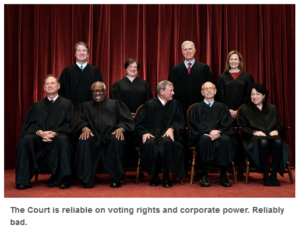 Ruth Bader Ginsburg, scholar, lawyer, judge, and Justice, died on Friday at the age of eighty-seven. Born the year Eleanor Roosevelt became First Lady, Ginsburg bore witness to, argued for, and helped to constitutionalize the most hard-fought and least-appreciated revolution in modern American history: the emancipation of women. Aside from Thurgood Marshall, no single American has so wholly advanced the cause of equality under the law.
Ruth Bader Ginsburg, scholar, lawyer, judge, and Justice, died on Friday at the age of eighty-seven. Born the year Eleanor Roosevelt became First Lady, Ginsburg bore witness to, argued for, and helped to constitutionalize the most hard-fought and least-appreciated revolution in modern American history: the emancipation of women. Aside from Thurgood Marshall, no single American has so wholly advanced the cause of equality under the law.
The change Ginsburg ushered into American politics began a half century ago, and reckoning with its magnitude requires measuring the distance between now and then. At the time, only three in a hundred legal professionals and fewer than two hundred of the nation’s ten thousand judges were women. In 1971, as Richard Nixon prepared to make two appointments to the Supreme Court, he faced a dilemma. Yet another Southerner he’d tapped had been nixed for an opposition to desegregation, so Nixon decided to look for someone who was, preferably, not a racist. He considered naming a woman. “I’m not for women, frankly, in any job,” he told his aides, in a little fit of hysterics. “Thank God we don’t have any in the Cabinet.” He didn’t think women should be educated, or “ever be allowed to vote, even.” But, given the momentum of the women’s-rights movement, he conceded the political necessity of naming a woman to the bench: it might gain him a small but crucial number of votes in the upcoming election. “It’s like the Negro vote,” he said. “It’s a hell of a thing.” Then Chief Justice Warren Burger, in a similar huff, told Nixon that, if he were to nominate a woman, he’d resign. In the end, Nixon named Lewis Powell.
While all these men were dithering, Ruth Bader Ginsburg was working for the A.C.L.U., writing the brief for a case set to go before the Court, Reed v. Reed. Decided on November 22, 1971, weeks after Powell’s confirmation hearings, Reed v. Reed upended a century of American jurisprudence and the entirety of political thought going back to the beginning of the Republic. Before 1971, as Ginsburg would later write, “Neither legislators nor judges regarded gender lines as ‘back of the bus’ regulations. Rather, these rules were said to place women on a pedestal.” Thomas Jefferson had taken the trouble to explain that women had no part in the Framers’ understanding of the government devised by the Constitution. “Were our state a pure democracy,” he wrote, “there would yet be excluded from their deliberations . . . women; who, to prevent deprivation of morals, and ambiguity of issues, could not mix promiscuously in the public gatherings of men.” Women were to be excluded for their own protection. The early women’s-rights movement, in the middle decades of the nineteenth century, had not defeated that argument, and the Fourteenth Amendment, ratified in 1868, did not explicitly—or implicitly, according to the Court—bar discrimination on the basis of sex. In 1873, ruling on a case in which Myra Bradwell had sued the state of Illinois for denying her the right to practice law, one Supreme Court Justice explained his logic this way: “The natural and proper timidity and delicacy which belongs to the female sex evidently unfits it for many of the occupations of civil life.” That, as Ginsburg liked to say, was a cage, pretending to be a pedestal.
Reed v. Reed, in 1971, involved an Idaho statute that gave preference to men—“males must be preferred to females”—in executing estates. The Court, following Ginsburg’s brief, ruled for the first time that discrimination on the basis of sex violated the equal-protection clause of the Fourteenth Amendment. Writing for the majority, Burger used language that had been introduced by Ginsburg: “To give a mandatory preference to members of either sex over members of the other, merely to accomplish the elimination of hearings on the merits, is to make the very kind of arbitrary legislative choice forbidden by the equal-protection clause of the Fourteenth Amendment; and whatever may be said as to the positive values of avoiding intrafamily controversy, the choice in this context may not lawfully be mandated solely on the basis of sex.” Just a few years later, Ginsburg was arguing her own cases before the Court, and the Chief Justice was stumbling over how to address her. “Mrs. Bader? Mrs. Ginsburg?”
Ruth Bader was born in Brooklyn in 1933 and went to Cornell, where she met Martin Ginsburg. They married and enrolled at Harvard Law School, which had only just begun admitting women. Ginsburg raised their baby, and also cared for Marty, who was diagnosed with cancer, and then she followed him to New York, finishing her law degree at Columbia. She faced discrimination on the basis of sex at every stage of her career. Tied for first in her class at Columbia, she was unable to get a job practicing law at a New York firm. But, far from being defeated by discrimination, she decided to study it. She began teaching at Rutgers in 1963; in 1969, the year her second child entered nursery school, she was promoted to full professor, and began volunteering for the A.C.L.U., where she later headed the Women’s Rights Project.
In 1972, just two months after the Court handed down its ruling in Reed v. Reed, Ginsburg became the first woman to hold a full professorship at Columbia. “The only confining thing for me is time,” she told the New York Times. “I’m not going to curtail my activities in any way to please them.” While teaching at Columbia, Ginsburg argued six cases before the Court, and won four. As Jeffrey Toobin reported in a Profile of Ginsburg, she took a crucial tip from the woman who typed her briefs. “I was doing all these sex-discrimination cases, and my secretary said, ‘I look at these pages and all I see is sex, sex, sex. The judges are men, and when they read that they’re not going to be thinking about what you want them to think about,’ ” Ginsburg said. She decided to rename this type of complaint “gender discrimination.”
Ginsburg sometimes said that tackling gender discrimination, case by case, was like “knitting a sweater,” a phrase perhaps meant to disarm her opponents. The actual sweater should have been a constitutional amendment. Ginsburg advocated, vehemently, for the ratification of the Equal Rights Amendment, which had been passed by Congress in 1972; she argued that it looked “toward a legal system in which each person will be judged on individual merit and not on the basis of an unalterable trait of birth.” And she regretted the Court’s logic in Roe v. Wade, in 1973, a case decided not on an equal-rights argument but on a privacy one. (As I pointed out in a 2018 essay, when asked by the A.C.L.U. to take on the defense of Roe, Ginsburg declined.) In 1980, when Jimmy Carter nominated Ginsburg to the D.C. Circuit Court, an aide in Strom Thurmond’s office, at her confirmation hearings, called her a “one-issue woman.” Thurmond was the only member of the committee to vote against her.
Ginsburg’s position on Roe earned her the ire of many feminists who failed to support her nomination to the Supreme Court, in 1993. “My approach, I believe, is neither liberal nor conservative,” she told the Senate Committee on the Judiciary, chaired by Joe Biden. That her nomination had been uncontroversial is entirely a myth, as is the idea that her opinions, after her confirmation, were caustic and biting, the “Ginsburns” of her character on “Saturday Night Live.” Ginsburg believed in the body of the Court, in collegiality of argument, and in moderation of expression. She was famously, even maddeningly, careful. She took so much time thinking about what people said to her, and choosing her own words, Toobin reported, that “her clerks came up with what they call the two-Mississippi rule: after speaking, wait two beats before you say anything else.”
Her most significant opinions were those she wrote for the majority, including in U.S. v. Virginia, a 1996 case in which the Court ruled that the Virginia Military Institute’s refusal to enroll female students violated the equal-protection clause. Ginsburg’s opinion served as a history lesson, partly for the public and partly for her fellow-Justices. “Through a century plus three decades and more, women did not count among voters composing ‘We the People,’ ” she wrote. “Not until 1920 did women gain a constitutional right to the franchise. And for a half century thereafter, it remained the prevailing doctrine that government, both federal and state, could withhold from women opportunities accorded men so long as any ‘basis in reason’ could be conceived for the discrimination.” The turning point, she observed, had come in Reed v. Reed: “In 1971, for the first time in our Nation’s history, this Court ruled in favor of a woman who complained that her State had denied her the equal protection of its laws.”
Of course, the real turning point had come when Ginsburg joined the bench. For most of Ginsburg’s career, the Court had been fairly moderate. It was not until the nineteen-eighties, when Reagan appointed Antonin Scalia, that modern conservatives began to join the Court. During Ginsburg’s tenure, George W. Bush appointed Justices Roberts and Alito, and Trump appointed Gorsuch and Kavanaugh. As the Court shifted, Ginsburg was cast as its Great Dissenter, though the role went largely against her disposition. Ginsburg cherished honest disagreement, firmly expressed, but she disliked petty, scathing opinions. In “Speaking in a Judicial Voice,” a lecture she delivered in 1992, the year before she joined the Court, she condemned “the immoderate tone of statements diverging from the positions of the court’s majority.” “The most effective dissent,” she wrote, “spells out differences without jeopardizing collegiality or public respect for and confidence in the judiciary.”
She stood by that, even as she found herself writing more and more separate opinions, a turn that began with Bush v. Gore (2000), in which she objected to the majority’s decision to halt the recount in Florida. “The Court’s conclusion that a constitutionally adequate recount is impractical is a prophecy the Court’s own judgment will not allow to be tested,” she wrote. “Such an untested prophecy should not decide the Presidency of the United States.” At the conclusion of that opinion, she allowed a rare breach of decorum, writing not “Respectfully, I dissent,” but, with a quiet fury, “I dissent.”
Ginsburg’s dissents carried a particular power, not only rhetorically but politically. On the Roberts Court, she became the leader of the liberal wing, and, in 2007, in a case involving Lilly Ledbetter, a supervisor for Goodyear Tires, she wrote a dissent objecting to the majority’s denial of an argument about sex discrimination in employment. That opinion was so compelling that it led to the passage of the Lilly Ledbetter Fair Pay Act, signed by Barack Obama in 2009. And perhaps Ginsburg’s most resonant dissent, in light of this year’s election, is the one she wrote in Shelby County v. Holder, in 2013, in which the majority all but struck down the 1965 Voting Rights Act, on the basis of the bizarre argument that it (and one of its features, known as “preclearance”) had effectively solved voter suppression for posterity. “Throwing out preclearance when it has worked and is continuing to work to stop discriminatory changes,” Ginsburg wrote, “is like throwing away your umbrella in a rainstorm because you are not getting wet.” When she read the dissent aloud in Court, as Jane Sherron De Hart observed in a recent biography, she added a conclusion that was not in the written version. “The arc of the moral universe is long, but it bends toward justice,” she said, quoting Martin Luther King, Jr. But it only bends that way, she went on, “if there is a steadfast commitment to see the task through to completion.” Much that Ginsburg predicted about the stripping away of voting rights has come to pass.
During Ginsburg’s final two decades on the court, she fought colon cancer (first diagnosed in 1999), pancreatic cancer (2009), underwent heart surgery (2014), suffered injuries from falls (2012 and 2018), underwent surgery for malignancies on her left lung (2018), and had radiation when the pancreatic cancer returned (2019). She seldom missed a day in court. She also regrettably, and presumably thinking Hillary Clinton would defeat Trump in 2016, resisted calls to retire during Obama’s second term, when he could have appointed a liberal Justice as her successor.
The pleasure Ginsburg took in her own celebrity, as she became a feminist icon, is understandable, if also troubling. Historically, the Court is meant to be insulated from public opinion, which also requires of the Justices that they lead largely private lives. Ginsburg was by no means the first to flout this convention, but she flouted it considerably, appearing on late-night television shows and becoming the subject of documentaries, feature films, and books for children. She spoke, in the last years of her life, to crowds numbering in the tens of thousands. And she came to regret the changes to the Court itself, the way hyperpolarization had transformed the nomination and confirmation process. “I wish I could wave a magic wand and have it go back to the way it was,” she said in 2018, after the Kavanaugh hearings.
There is no magic wand, and there is no going back. The Supreme Court, like much of the rest of the federal government, is at risk of becoming an instrument of the executive instead of a check against it. Preserving the Court’s independence will require courage and conviction of Ginsburgian force. And there are changes, too, that most of us would never want undone. A century after the ratification of the Nineteenth Amendment, Ruth Bader Ginsburg’s pioneering career as a scholar, advocate, and judge stands as a monument to the power of dissent. The natural and proper timidity and delicacy which belongs to the female sex evidently unfits it for many of the occupations of civil life. It took centuries, and tens of millions of women, to dismantle that nonsense. And no single one of them was more important than Ginsburg, warm-hearted, razor-sharp, and dauntless.
No matter how you feel about El Caudillo Del Mar-a-Lago‘s gifts as an authoritarian, there’s no mistaking the fact that, for his entire public career, William Barr has been the genuine article. He really does believe that the Constitution bestows upon the president—even this burlesque of a president* that we have now—absolute power, or something close enough to it that still would allow the country to call itself a democratic republic without the rest of the world doing a spit-take you could hear on Mars. As a special prosecutor was closing in on President George H.W. Bush for the latter’s involvement in the Iran-Contra scandal, Barr was the one who told Bush to pardon everyone except Shoeless Joe Jackson on his way out the door because a cover-up was well within the powers of the presidency as described in Article II. This was so egregious that even the late William Safire, who wrote speeches for Nixon, for pity’s sake, called Barr the “Cover-Up General.”
Now, though, because he’s working for a president* who doesn’t know anything about anything, and who is proud of that fact, Barr has the perfect vessel through whom to exercise all those theories of his that wear armbands when they go to work. There simply is nothing that this president* can do that Barr can’t cloak in highfalutin’ lawyer-speak, which the president* will repeat, because he doesn’t know anything about anything. On Wednesday, though, Barr went out on his own and let his freak flag fly proudly in a Constitution Day speech at Hillsdale College. Quite simply, he went to war against the prosecutors in the Department of Justice that he purportedly leads.
The Justice Department is not a praetorian guard that watches over society impervious to the ebbs and flows of politics. It is an agency within the Executive Branch of a democratic republic — a form of government where the power of the state is ultimately reposed in the people acting through their elected president and elected representatives. The men and women who have ultimate authority in the Justice Department are thus the ones on whom our elected officials have conferred that responsibility — by presidential appointment and Senate confirmation. That blessing by the two political branches of government gives these officials democratic legitimacy that career officials simply do not possess.
The same process that produces these officials also holds them accountable. The elected President can fire senior DOJ officials at will and the elected Congress can summon them to explain their decisions to the people’s representatives and to the public. And because these officials have the imprimatur of both the President and Congress, they also have the stature to resist these political pressures when necessary. They can take the heat for what the Justice Department does or doesn’t do.
Line prosecutors, by contrast, are generally part of the permanent bureaucracy. They do not have the political legitimacy to be the public face of tough decisions and they lack the political buy-in necessary to publicly defend those decisions. Nor can the public and its representatives hold civil servants accountable in the same way as appointed officials. Indeed, the public’s only tool to hold the government accountable is an election — and the bureaucracy is neither elected nor easily replaced by those who are.
This is nothing less than the Attorney General of the United States cutting the legs out from under every federal prosecutor across the country. Moreover, in talking darkly about the “permanent bureaucracy,” Barr is plowing headlong into Caputoland. Michael Caputo resigned his post at the Department of Health and Human Services on Wednesday because he’d gone bananas in a Facebook Live chat, yammering about “deep state” actors at the Centers for Disease Control. Here now comes William Barr saying pretty much the same thing about the career prosecutors under his nominal command, and arguing that only the Senate-confirmed officials at the top of the DOJ food chain have “democratic legitimacy”—in other words, only people like William Barr have the political credibility to resist political pressure.
By clear implication, Barr is defining the job of attorney general as a purely political post, an extension of the executive power of the president, a theory that has not worked out very well in practice over the past two or three Republican presidencies, and a theory that I will bet a buffalo nickel Barr would never apply to, say, Loretta Lynch. But it is a theory under which Barr can justify being this administration*’s primary manure spreader. For example, an AG has no business doing an interview in which he opines about what a big socialist Joe Biden is, which Barr did only this week. However, if Barr perceives his job as a political arm of the executive, then that is something he would feel free to do.
As far as putting these theories into practice, we only have to look in the New York Times to discover that Barr planned to bring the full weight of the Italian government of 1932 down on the United States of 2020.
The attorney general has also asked prosecutors in the Justice Department’s civil rights division to explore whether they could bring criminal charges against Mayor Jenny Durkan of Seattle for allowing some residents to establish a police-free protest zone near the city’s downtown for weeks this summer, according to two people briefed on those discussions. Late Wednesday, a department spokesman said that Mr. Barr did not direct the civil rights division to explore this idea.
The directives are in keeping with Mr. Barr’s approach to prosecute crimes as aggressively as possible in cities where protests have given way to violence. But in suggesting possible prosecution of Ms. Durkan, a Democrat, Mr. Barr also took aim at an elected official whom President Trump has repeatedly attacked…
“The power to execute and enforce the law is an executive function altogether,” Mr. Barr said in remarks at an event in suburban Washington celebrating the Constitution. “That means discretion is invested in the executive to determine when to exercise the prosecutorial power.”
Of course, Barr can legitimately sic the DOJ on the mayor of Seattle because Barr was confirmed by the Senate and, if the president* thinks he’s gone too far, he can be removed through the political process. I see nothing that can possibly go wrong with this.
Or, we only have to pick up the Washington Post‘s story about the government’s apparent desire to make a slaughter pen out of Lafayette Square so that the president* could walk across the street and hold up a Bible.
D.C. National Guard Maj. Adam D. DeMarco told lawmakers that defense officials were searching for crowd control technology deemed too unpredictable to use in war zones and had authorized the transfer of about 7,000 rounds of ammunition to the D.C. Armory as protests against police use of force and racial injustice roiled Washington. …
Just before noon on June 1, the Defense Department’s top military police officer in the Washington region sent an email to officers in the D.C. National Guard. It asked whether the unit had a Long Range Acoustic Device, also known as an LRAD, or a microwave-like weapon called the Active Denial System, which was designed by the military to make people feel like their skin is burning when in range of its invisible rays. The technology, also called a “heat ray,” was developed to disperse large crowds in the early 2000s but was shelved amid concerns about its effectiveness, safety and the ethics of using it on human beings.
Heat rays? Seven thousand rounds of live ammunition? Under an AG who hates the whole notion of federal prosecutors, largely because they inconvenienced the criminal-adjacent presidencies he has served? I’m sure there would be solid constitutional grounds of any ensuing bloodletting. William Barr means it. The sooner he’s pried loose from his job, the better.















